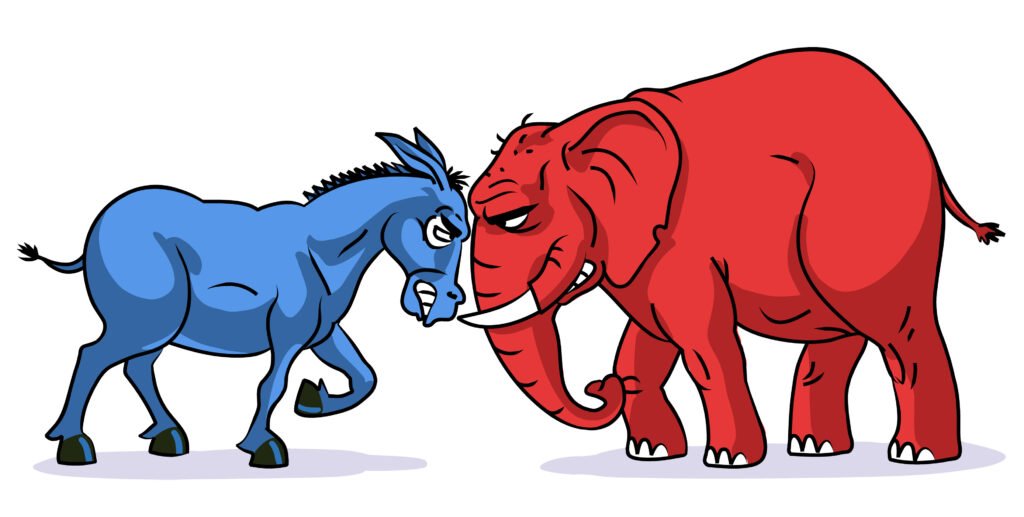Politics and College Football: An Intriguing Intersection Amidst an Election Year
WASHINGTON — Picture the scene: September 2020, the nation trembling under the weight of a divisive presidential election and the unforgiving grip of the COVID-19 pandemic. College football, normally the bastion of weekend entertainment, suddenly found itself thrust into the political limelight, an unusual pawn in the game of power.
Back then, the then-President Donald Trump, with a flourish and without missing a beat, declared to millions of viewers that he had “brought back” Big Ten football, a bold assertion, claiming he had persuaded league officials to renew the season when they had intended to postpone it to spring. However, the leaders of the conference were quick to clarify that such decisions stemmed from medical advice and improved testing protocols, rather than any political maneuvering.
Fast forward to 2024, and here we are once more, standing at the precipice of another contentious election season. Yet this time, the question is not whether football will be played, but rather who will get paid to play.
As Tuesday’s election approaches—covering both congressional races and the presidency—experts propose that these decisions could resonate profoundly throughout the future of college athletics. “Collegiate athletic policies—like so many issues—are hanging precariously in the balance,” asserts Julie Sommer, executive director of the Drake Group, an organization dedicated to upholding academic integrity in sports.
In an ironic twist, the unfolding elections align with the inaugural unveiling of the College Football Playoff selection committee’s rankings. Although the implications of the top 25 rankings may spark immediate chatter, the broader electoral outcomes will shape college sports in ways that echo well beyond the gridiron.
The fate of college sports has never felt more tenuous as it navigates a transformative era that often brings it closer to a professional model. The tribulations of the upcoming elections are poised to impact policy-makers in ways they have not faced before—spanning extensive grounds: (1) comprehensive legislation affecting collegiate athletics; (2) the intricacies of Title IX, particularly regarding athlete revenue sharing; and (3) an ongoing debate about recognizing college athletes as employees.
“The stakes have never been higher in the world of college sports,” reflects Jesse McCollum, a seasoned lobbyist affiliated with The Collective Association, a consortium of NIL collectives.
Legislation
The power players of college athletics, primarily NCAA officials and administrators from elite conferences, have been tirelessly courting lawmakers over the past five years. Their goal? To solidify protections that would empower them to enforce the rules of a system at risk of unraveling under scrutiny from courts and state legislators.
Currently, the conferences are pushing for key elements in any proposed legislation: (1) a prohibition on classifying college athletes as employees and (2) the formalization of the NCAA’s settlement of the House antitrust lawsuit, with expectations of a limited antitrust exemption in tow.
Despite a slew of lobbying efforts that have racked up an eye-watering price tag, only a solitary bill has made it past committee stages, yet has languished in legislative limbo. Divided along partisan lines, the struggle reflects broader ideological splits—Republicans favoring regulatory protections for the NCAA while Democrats advocate for athlete rights and potential employment protections.
With the elections looming, control of legislative chambers emerges as a critical variable. Tom McMillen, a former congressman engaged in college sports lobbying, identifies Republican Senator Ted Cruz as a bellwether whose re-election could alter the momentum of college sports legislation significantly.
Title IX
Looking ahead, Title IX reemerges as a pivotal concern amidst discussions of equity and fairness. Starting July, a House settlement will enable schools to allocate a staggering $20.5 million annually to their athletes, a noteworthy development that begs the questions of fairness in distribution.
The enforcement of Title IX—a federal mandate demanding equal opportunities for male and female athletes—could take on renewed urgency under a female president, particularly one with a focus on the nuanced inequities that persist in sports. Should Vice President Kamala Harris ascend to the presidency, stakeholders believe she would prioritize a more robust enforcement of Title IX relevant to revenue-sharing mechanics, a sentiment echoed by various Democratic members of Congress.
Currently, the lack of a standardized distribution method remains troubling, with many schools likely to favor a skewed allocation formula heavily favoring football and men’s basketball over other sports.
Employment
The quest to categorize college athletes as employees paints a complex picture fraught with tension. There exists a burgeoning consensus among some administrators and coaches that granting employee status is vital to stabilizing an increasingly erratic system that seems to teeter on the brink of chaos. However, NCAA officials and numerous power brokers staunchly oppose this movement, even as certain lawmakers exhibit reservations regarding the employment route for athletes.
Jim Cavale, founder of Athletes.Org, underscores that the future of college sports, particularly regarding the employment debate, hangs in the margins of the election results. Now, the paths toward employee status for athletes appear through either the courts or the auspices of the National Labor Relations Board (NLRB), the agency tasked with upholding labor laws in the U.S. and currently pursuing unfair labor practices against various institutions.
As the dust of this election settles, the intersection of politics and college sports will undoubtedly shape its future; the ramifications of these decisions promise to ripple through the NCAA and its stakeholders for years to come—leaving many to ponder, what next?
The stakes are high, and the outcome could usher in a new era amidst the storied tradition of college athletics.

